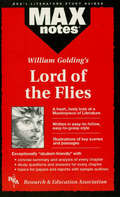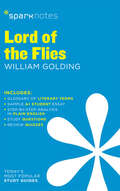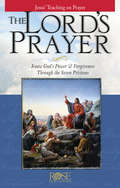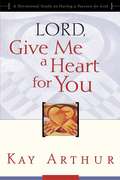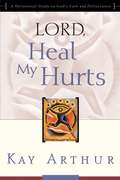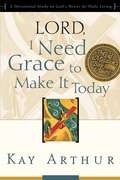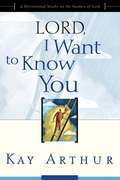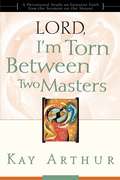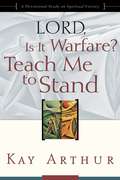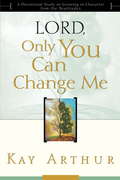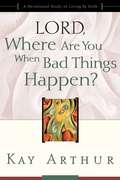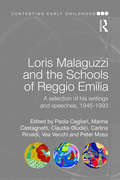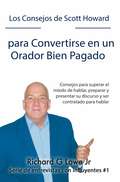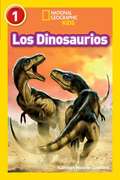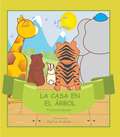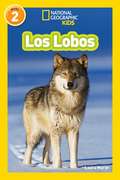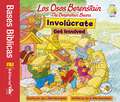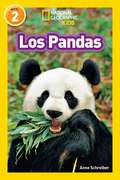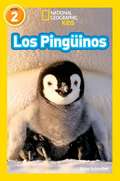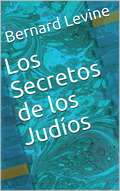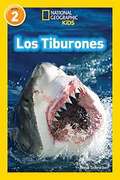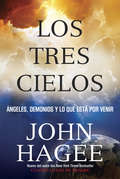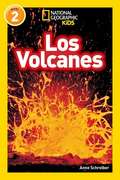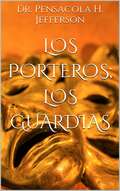- Table View
- List View
Lord of the Flies (MAXNotes Literature Guides)
by Walter FreemanREA's MAXnotes for William Golding's Lord of the Flies MAXnotes offer a fresh look at masterpieces of literature, presented in a lively and interesting fashion. Written by literary experts who currently teach the subject, MAXnotes will enhance your understanding and enjoyment of the work. MAXnotes are designed to stimulate independent thought about the literary work by raising various issues and thought-provoking ideas and questions. MAXnotes cover the essentials of what one should know about each work, including an overall summary, character lists, an explanation and discussion of the plot, the work's historical context, illustrations to convey the mood of the work, and a biography of the author. Each chapter is individually summarized and analyzed, and has study questions and answers.
Lord of the Flies SparkNotes Literature Guide (SparkNotes Literature Guide Series #42)
by SparkNotesLord of the Flies SparkNotes Literature Guide by William Golding Making the reading experience fun! When a paper is due, and dreaded exams loom, here's the lit-crit help students need to succeed! SparkNotes Literature Guides make studying smarter, better, and faster. They provide chapter-by-chapter analysis; explanations of key themes, motifs, and symbols; a review quiz; and essay topics. Lively and accessible, SparkNotes is perfect for late-night studying and paper writing. Includes:An A+ Essay—an actual literary essay written about the Spark-ed book—to show students how a paper should be written.16 pages devoted to writing a literary essay including: a glossary of literary termsStep-by-step tutoring on how to write a literary essayA feature on how not to plagiarize
Lord's Prayer: Knowing God's Power & Forgiveness Through the Seven Petitions
by Rose PublishingThe Lord's Prayer ebook explores and explains the way that Jesus taught his followers to pray. Each phrase of Jesus' prayer model is examined, using both NIV and KJV Scriptures. Each phrase reflects a different attribute of God; the ebook explores the meaning of each attribute and the petition the prayer reveals. The ebook also offers additional Scripture references and examples of Jesus demonstrating God's attributes. This bestselling 12-panel pamphlet gives believers new insights into our Heavenly Father, his power, and forgiveness. Full-color design.The Lord's Prayer ebook is one of the easiest ways to teach the purpose of the prayer, the guidelines Jesus taught, and their power to put needs and desires in proper perspective. Pastors may want to purchase a copy of this pamphlet for each church member to use in Bible study or private devotion. The easy-to-use format provides a concise look at: *Each phrase in the prayer, with traditional and contemporary wording *Seven of God's attributes *The importance of submitting our will to his will*Asking for our needs and our forgiveness *An understanding of three main purposes of prayer*Six powerful reasons to forgiveThe Lord's Prayer is a powerful and life-changing prayer, and The Lord's Prayer ebook is a dynamic tool that strengthens the prayer life of believers. In addition to presenting Jesus' prayer in both KJV and NIV versions, the ebook also presents:*Other prayers in Scripture that follow similar patterns*The history of the Lord's Prayer (found in the Books of Matthew and Luke) and why it was different from other prayers of Jesus' time*A brief examination of the words "debts" and "trespasses"*A chart of the "seven petitions" of The Lord's Prayer that believers can use in prayer to bring Jesus' teaching to bear on their prayer life*A chart of six reasons to forgive, the result of forgiveness, and Scripture references.
Lord, Give Me a Heart for You: A Devotional Study on Having a Passion for God
by Kay ArthurKay Arthur's Newest "Lord" Book Examines TheAnatomy Of A Heart for God Through Paul's Eyes.Throughout his ministry the Apostle Paul was criticized, opposed, and attacked. He wrestled with his weaknesses. He struggled with fragile relationships. He was often weary, tired, and discouraged. Kay Arthur knows there are times when you can identify with Paul's experience. You feel overwhelmed by conflicts without and fears within. You yearn to experience the God of wisdom and power. You, like Paul, want deeply to be a person whose sole passion is to please God.In this study based on 2 Corinthians, Kay examines the anatomy of a heart for God. What it looks like. What it feels like. And how you can strengthen your own relationship with God.Despite the deep physical, emotional, and spiritual pain of life, Paul could rest in the God of all comfort and strength. He could walk in obedience to his calling. He could fight the good fight, finish his race, and keep the faith. And now, through this compelling, insightful, and moving Bible study, so can you."What does a heart for God look like when lived out in flesh and blood in the daily circumstances of life? As we walk together through 2 Corinthians, Acts, and other portions of Scripture, we'll begin to understand what it's like to have a heart like His." -Kay ArthurTHE "LORD" SERIES by Kay Arthur is an insightful, warm-hearted Bible study series designed to meet you where you are-and help you discover God's answers to your deepest needs.From the Trade Paperback edition.
Lord, Heal My Hurts: A Devotional Study on God's Care and Deliverance
by Kay ArthurEnjoy the expanded and updated editions of the best-selling "Lord" Bible Study Series from Kay Arthur. The "Lord" study series is an insightful, warm-hearted Bible study series designed to meet readers where they are--and help them discover God's answers to their deepest needs. No Matter How Deep the Wounds, God Can Heal Your Hurts.Everyone hurts. The pain runs deep, the scars never seem to fade, the memories torment us. As a result, our growth is stunted, our walk crippled, our relationships infected. Will relief never come?Yes -- when you put yourself in the hands of Jehovah-rapha, the God who heals! No matter what you've done or what's been done to you, He wants to be your refuge. He loves you. And He offers healing for your deepest wounds. Discover how God can turn your sorrow into joy in Lord, Heal My Hurts. Let Kay Arthur guide you through the Scriptures so you can be set free from past hurts by the power of God. This powerful, insightful study will minister to you in deeply restorative ways. And these are truths you will want to share with others.From the Trade Paperback edition.
Lord, I Give You This Day: 366 Appointments with God
by Kay ArthurDo you long for intimate communion with God?Are you tired of struggling through life?Are you eager to experience the abundant life offered by Jesus?Discover the Joy of Taking God at His Word!In this power-packed daily devotional, Kay Arthur beckons you to a deeper relationship with God, helping you discover for yourself the life-changing power of His unshakeable love. As each brief reading draws you into the Bible and leads you into purposeful prayer, you'll be equipped to greet each day with bold faith, confident in God's faithfulness, strength, and transforming grace.Discover the joy and peace that come with daily surrender, with joyfully declaring each morning: Lord, I Give You This Day!From the Hardcover edition.
Lord, I Need Grace to Make It Today: A Devotional Study on God's Power for Daily Living (Lord Bible Study)
by Kay ArthurEnjoy the expanded and updated editions of the best-selling "Lord" Bible Study Series from Kay Arthur. The "Lord" study series is an insightful, warm-hearted Bible study series designed to meet readers where they are--and help them discover God's answers to their deepest needs.In the Dark Times of Failure and Fear, Let God Lavish His Grace on You. There are times when we all wonder if we'll make it in life -- and if it's worth even trying. Feelings of unworthiness and guilt over past sins, times of spiritual weakness and inadequacy -- the burdens seem overwhelming. Don't give up! God's grace is available freely and lavishly for all who would take it. If you long for the covering of God's grace, let Kay Arthur guide you through the Word of God. Discover how to appropriate God's grace for every situation and every emotion you must face. Lord, I Need Grace to Make It Today is a devotional study that will minister to you in intimate ways. And it is truth you can share easily with others, individually or in small groups.From the Trade Paperback edition.
Lord, I Want to Know You: A Devotional Study on the Names of God
by Kay ArthurEnjoy the expanded and updated editions of the best-selling "Lord" Bible Study Series from Kay Arthur. The "Lord" study series is an insightful, warm-hearted Bible study series designed to meet readers where they are--and help them discover God's answers to their deepest needs.Discover the Limitless Power of God's Name. So much of our confusion and pain results because we don't know God -- who He really is, how He works in our lives. But with Lord, I Want to Know You, that will all change. When you know God more fully by studying His names -- Creator, Healer, Protector, Provider, and many others -- you'll gain power to stand strong. You'll find strength for times of trial, comfort for pain, provision for your soul's deepest needs. And your walk with God will be transformed. Let Kay Arthur guide you through the Scriptures in this deeply insightful study. Your daily time with God in His Word will introduce you to the limitless treasure available to you as His child. And these are truths you can share easily with others, individually or in small groups.From the Trade Paperback edition.
Lord, I'm Torn Between Two Masters: A Devotional Study on Genuine Faith from the Sermon on the Mount
by Kay ArthurEnjoy the expanded and updated editions of the best-selling "Lord" Bible Study Series from Kay Arthur. The "Lord" study series is an insightful, warm-hearted Bible study series designed to meet readers where they are--and help them discover God's answers to their deepest needs.Does It Sometimes Feel Impossible to Measure Up to God's Standards? On a hillside overlooking the Sea of Galilee, Jesus opened the doorway to the kingdom of God. He challenged His followers to pursue a faith without compromise. Without anxiety. Without judgmentalism. He encouraged them to build a faith that bears fruit. A faith built on rock. A faith that would be true to the only Lord and Master. Is that the kind of faith you want? It sounds impossible. It feels unreachable. How can you possibly measure up? Let Kay Arthur lovingly guide you through the life-changing Sermon on the Mount in her devotional study, Lord, I'm Torn Between Two Masters. It will minister to you in intimate ways. And these are truths you can share easily with others in small groups.From the Trade Paperback edition.
Lord, Is It Warfare? Teach Me to Stand: A Devotional Study on Spiritual Victory (Lord Bible Study)
by Kay ArthurEnjoy the expanded and updated editions of the best-selling "Lord" Bible Study Series from Kay Arthur. The "Lord" study series is an insightful, warm-hearted Bible study series designed to meet readers where they are--and help them discover God's answers to their deepest needs.Are You Fully Equipped for Spiritual Battle?Once you become a Christian, you enter a war zone. The problem is, you may not even realize it. But that's about to change. Lord, Is It Warfare? will equip you to recognize and understand the spiritual warfare that is inevitable for those who follow the Lord Jesus Christ. You'll learn all the battle tactics and devices of your adversary, Satan. And you'll discover scriptural ways to overcome the enemy by turning to Christ, who loves you and offers you all the strength, wisdom, and power you need for victory.Let Kay Arthur guide you through the Scriptures every day in this comprehensive inductive study. Your time with God in His Word will minister to you and help you stand strong in the face of spiritual conflict. And these are truths you can share easily with others, individually or in small groups.From the Trade Paperback edition.
Lord, Only You Can Change Me: A Devotional Study on Growing in Character from the Beatitudes (The\lord Bible Study Ser.)
by Kay ArthurEnjoy the expanded and updated editions of the best-selling "Lord" Bible Study Series from Kay Arthur. The "Lord" study series is an insightful, warm-hearted Bible study series designed to meet readers where they are--and help them discover God's answers to their deepest needs.Can God Really Change You from the Inside Out? Yes! Who are you...on the inside? Are you growing into the image of Christ? Or are you far from being all you want to be in the Lord? If you've ever wondered how you can truly change, now there's hope. Jesus invites you to stop trying to develop godliness through your own efforts and to start relying on the indwelling Holy Spirit. That's the way to a deep, rich, honest relationship with your heavenly Father. That's the way to become godly to the core. In Lord, Only You Can Change Me, Kay Arthur guides you through the Beatitudesso you can begin living a truly transformed life. Her in-depth study of the Sermon on the Mount will minister to you in intimate ways. And these are truths you can share easily with others, individually or in small groups.From the Trade Paperback edition.
Lord, Where Are You When Bad Things Happen?: A Devotional Study on Living by Faith
by Kay ArthurEnjoy the expanded and updated editions of the best-selling "Lord" Bible Study Series from Kay Arthur. The "Lord" study series is an insightful, warm-hearted Bible study series designed to meet readers where they are--and help them discover God's answers to their deepest needs.Chaos. Tragedy. Brokenness. Where Is God? You never dreamed it would happen to you. You cry for help...but God doesn't seem to hear. Why? Chaos, tragedies, broken relationships -- how could a God who is all-powerful, all-wise, and all-loving allow these things? And what about the wars, disasters, and plagues tearing the world apart? If God really is who He says He is, how can He let these things happen? Why doesn't He do something? In Lord, Where Are You When Bad Things Happen? Kay Arthur will guide you tothe answers through the book of Habakkuk, helping you know God, understand Him, and love Him more fully. This daily study will minister to you and help you walk by faith. These are invaluable truths you can share easily with others, individually or in small groups.From the Trade Paperback edition.
Loris Malaguzzi and the Schools of Reggio Emilia: A selection of his writings and speeches, 1945-1993 (Contesting Early Childhood)
by Peter Moss Paola Cagliari Marina Castagnetti Claudia Giudici Carlina Rinaldi Vea VecchiLoris Malaguzzi was one of the most important figures in 20th century early childhood education, achieving world-wide recognition for his educational ideas and his role in the creation of municipal schools for young children in the Italian city of Reggio Emilia, the most successful example ever of progressive, democratic and public education. Despite Malaguzzi’s reputation, very little of what he wrote or said about early childhood education has been available in English. This book helps fill the gap, presenting for the first time in English, writings and speeches spanning 1945 to 1993, selected by a group of his colleagues from an archive established in Reggio Emilia. They range from short poems, letters and newspaper articles to extended pieces about Malaguzzi’s early life, the origins of the municipal schools and his ideas about children, pedagogy and schools. This material is organised into five chronological chapters, starting at the end of World War Two and ending just before his death, with introductions to each chapter providing background, including the historical context, the main events in Malaguzzi’s life and the rationale for the selection of documents. The book provides a unique insight into the background, thinking and work of Malaguzzi, revealing, in his own words, how his thinking developed, how he moved between theory and practice, how he border-crossed many disciplines and subjects, and how he combined many roles ranging from administrator and campaigner to researcher and pedagogue. Academics, students and practitioners alike will find this landmark publication provides rich insights into his life and work.
Los Consejos de Scott Howard para Convertirse en un Orador Bien Pagado
by Richard LoweEstimado lector, Gracias por comprar una copia deLos Consejos deScott Howard para convertirse en un Orador Público Bien Pagado. Este libro le enseñará habilidades, herramientas y técnicas críticas para hablar en público y más, que todo orador necesita comprender y aplicar. Este libro fue transcrito a partir de una entrevista en vivo. Es por eso que se lee como una conversación en lugar de un "libro" tradicional que habla "hacia" usted. Prepárese para llevar su discurso público al siguiente nivel para que pueda comprender cómo convertirse en un orador público bien pagado. Sinceramente, Scott Howard
Los Junglies Construyen una Casa en un Árbol
by Francois Keyser Andrés ParraudEste libro de la serie "The Junglies" los amigos de la selva descubren que, más allá de su casa, hay otros lugares hermosos e interesantes que quieren ver. Pero tienen un problema: No pueden viajar; pero, como no son de los que se rinden fácilmente, deciden buscar la manera de ver otros lugares del mundo... Averigua qué hacen para tratar de ver otros lugares, y qué descubren en lugar de ello... Este episodio de la serie de libros "The Junglies" enseña a los jóvenes lectores que a veces tenemos que cambiar la forma en que vemos las cosas para apreciar lo que tenemos. El tema del trabajo en equipo se muestra otra vez en este libro, como en "Unidad en la diversidad", con todos los amigos representados por distintos animales trabajando juntos para superar los desafíos que se les presentan y también divertirse. "The Junglies" fueron inspirados por la hija mayor del autor. La serie de libros "The Junglies" está dirigida a niños de entre 1 y 7 años de edad.
Los Lobos (National Geographic Readers #2)
by Laura MarshCorren en manadas, cazan a sus presas y aúllan frente a la luna. Y no importa dónde estés—siempre están escondidos en algún lugar cerca. Gente de todo el mundo teme y ama a los lobos, los cachorritos depredadores del mundo salvaje. ¿Pero realmente los entendemos? <P><P> En este libro fascinante para niños de nivel 2 en español, aprenderás que la vida de un lobo es mucho más complicada de lo que nosotros creemos. ¿Sabías que cada manada tiene su jefe y sus seguidores? ¿O que los lobos“hablan” entre ellos usando sus cuerpos? ¿O que realmente no quieren atacar a los humanos, que nos prefieren dejar en paz? Lleno de fotografías increíbles e información interesante, NGR Lobos es divertido para todos los niños.
Los Osos Berenstain Involúcrate / Get Involved (Los Osos Berenstain)
by Jan & BerenstainCuando una tormenta golpea Bear Country, y Bear Country está en peligro de inundarse, ¡todo depende de la familia Oso y del resto del equipo de rescate de la capilla en el bosque para reunirse y salvar a su comunidad!.En este maravilloso libro, los niños descubren el valor de ayudar a los demás y y de participar en comunidad. La serie de los Osos Berenstain ayuda a los niños a aprender de qué manera quiere Dios que vivan día tras día..
Los Pandas (National Geographic Readers #2)
by Anne SchreiberTodo el mundo ama a los pandas. Nos encanta verlos jugar, trepar, dormir y masticar. ¡Pero cuidado, también rasguñan—mira ese árbol! <P><P> Ilustrado con maravillosas imágenes que registran el lugar único de este animal en China y en todo el mundo, este libro en español es para niños de Nivel 2 que leen solos o con ayuda de vez en cuando.
Los Secretos de los Judíos
by Bernard LevinePara todos los que han anhelado y deseado recorrer la tierra de Israel, para todos aquéllos que aman el pueblo Judío y han ansiado descubrir más sobre su religión y estilo de vida, para todos los Cristianos que aman a Jesús y a quienes les gustaría aprender más sobre sus raíces Judías. . . ¡Este libro único está lleno de joyas muy especiales!
Los Tres Cielos: Ángeles, Demonios Y Lo Que Está Por Venir
by John HageeAs sales of Hagee's current New York Times bestseller, Four Blood Moons, continue to soar, hundreds of thousands of readers have had their thirst whetted to know what is to come at the end of this world . . . heaven itself! Hagee's national media power assures another mega-bestseller.
Los Volcanes (National Geographic Readers #2)
by Anne Schreiber National Geographic Kids Staff¡AHORA EN ESPAÑOL! Este libro fascinante nos permite mirar dentro de los volcanes con un poco de ciencia, un poco de historia y muchas imágenes impresionantes de National Geographic. <P><P> Piedra caliente fundida desde el centro de nuestro planeta es forzada a viajar por las grietas en la corteza de la Tierra hasta explotar, violenta e inesperadamente, en una erupción que puede durar meses y a veces años. Únete a la aventura para aprender más acerca de los volcanes, uno de los fenómenos más espectaculares de la naturaleza.
Los porteros; los guardias
by DR Pensacola H JeffersonUn PROCESO, de cualquier tipo, implica una secuencia de acciones o movimientos que efectúan cambios hacia adelante. “… Y en el PROCESO del tiempo, ACABÓ DE PASAR…” (Génesis 4: 3 KJV). Estos cambios de avance pueden ser una sucesión de actividades gradual, rápida, extremadamente lenta o constante. Independientemente de lo rápido o lento que sea el PROCESO; SIEMPRE es una secuencia continua de acciones o movimientos con un propósito definido y un resultado final. “… A través de este PROCESO el sacerdote te purificará de tu pecado, HACIENDO JUSTICIA con el Señor, y serás perdonado…” (Levítico 5:10 NTV). PROCESO tiene como objetivo mover o llevar a cabo cosas o individuos hacia adelante y la secuencia de acciones o movimientos a menudo parece inexistente o prácticamente invisible. “… Andad POR FE…” (2 Corintios 5: 7 KJV). La secuencia de acciones o movimientos, en un PROCESO, son tareas o procedimientos individuales que TODOS se vinculan para producir una meta o alcanzar un resultado final. “… Luego debe bañarse con agua en un lugar sagrado, (SIGUIENTE) ponerse sus ropas regulares, y (SIGUIENTE) salir a sacrificar un holocausto para él y un holocausto para el pueblo. A través de este PROCESO, se purificará a sí mismo y a la gente, haciéndolos justos con el Señor… ”. (Levítico 16:24 NLT). El PROCESO de secuencias y acciones se trata de una cosa o posiblemente un individuo QUE SE ALTERA a través de esta procesión de movimientos hacia adelante. “… A través de este PROCESO, HIZO santo el altar purificándolo…” (Levítico 8: 5 NTV). Eventualmente, PROCESS producirá un resultado después de un cierto período de tiempo. “… Y en el PROCESO del tiempo“ ACABÓ ”A PASAR…” (Génesis 4: 3 KJV). Además, PROCESO es una secuencia de acciones y movimientos que requieren una cierta cantidad de tiempo y tareas o procedimientos particulares que trabajan juntos
